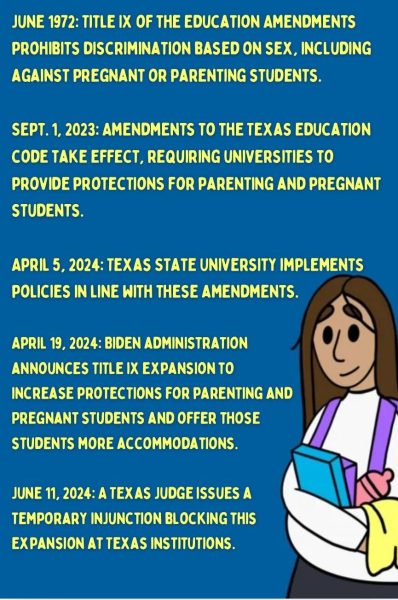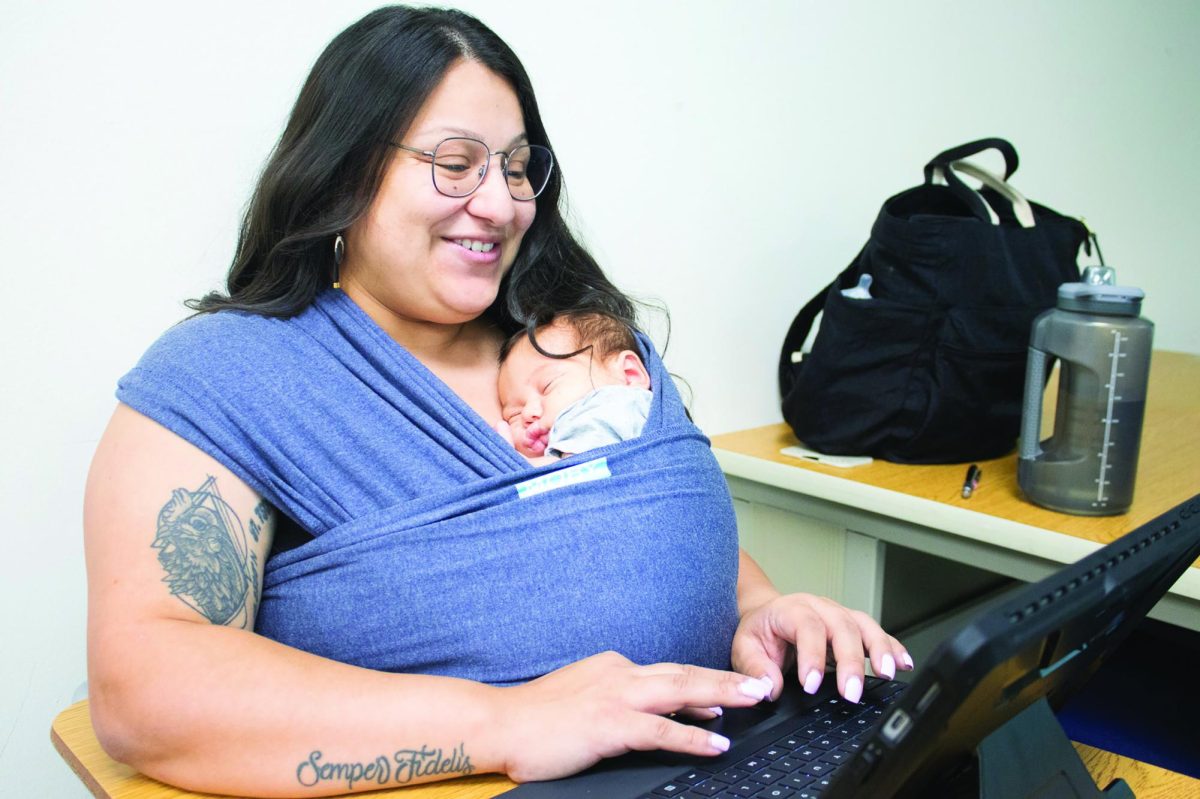Following the implementation of policies last spring to accommodate pregnant and parenting students in compliance with the Texas Education Code, this semester marks the first full term in which these accommodations are available.
“[Texas State] is attracting all types of students and we’re acknowledging that not every student is going to be the first time, traditionally-aged college student,” Senior Associate Dean of Students and student parent liaison Laramie McWilliams said. “We’re providing the infrastructure and the resources to support their success.”
The 88th Texas Legislature amended the Texas Education Code to include sections requiring Texas higher education institutions to provide protections, accommodations and resources for pregnant and parenting students, effective Sept. 1, 2023. The section also required universities to adopt a student parent liaison position.
“I enjoy being the support that says, ‘we’re in your corner and we can work together to make sure that you can move forward in your educational career,'” McWilliams said.
According to Texas State’s policy, the student parent’s liaison responsibilities primarily consist of providing students with “information regarding support services and other resources available to parenting students.”
Texas State awaited guidance from the Texas Higher Education Coordinating Board (THECB) before officially implementing its policy on April 5.
Before this new policy, pregnant and parenting students would seek accommodations or aid through the Compassion Advocacy Resources & Education (CARE) Center. As senior associate dean of students and student ombudsperson for the dean of students office, McWilliams worked with pregnant students at the CARE center for about two years before stepping in as student parent liaison on Aug. 1.
Some of the guidance from THECB allows pregnant or parenting students to take a semester break and return to classes without having to reapply if they’re in good academic standing.
“Normally, if a student’s out for a long semester, [they] would have to reapply which comes with an application or reapplication fee– it’s $75 or $90 for an international student,” McWilliams said. “That was another barrier for our student parents that this legislation takes away.”
Texas State’s policy aligns with the Texas Education Code, protecting pregnant and parenting students from discrimination. It includes offering accommodations like early registration and excused absences for missed assignments.
Maritza Smith, communications and Spanish senior, is a full-time student parent with five children with her youngest being five weeks old. Smith said she takes her youngest to class all the time.
“They’ve [Smith’s professors] provided nursing and break rooms, offered me snacks and drinks, and some of my teachers have held or carried my baby,” Smith said. “I’ve been really supported.”
Amira Johnson, digital media and innovations senior, is pregnant and a mother to a 10-month-old boy. Johnson works full time and is a part-time student. She gave birth in November 2023, when she was going to school and working full time.
“Last fall was my toughest semester because I had a new job and couldn’t get maternity leave, and then returning back to school while still healing with a newborn was just emotional,” Johnson said. “If I knew about or had accommodations, then it could’ve been way better.”
Johnson is unsure she’ll need the accommodations this semester because she only has two classes, but it would be a good safety net.
“I think some students may not realize what protections exist,” McWlliams said. “Once students meet with me, they might feel more confident in their ability to pursue their degree.”
Since the Title IX of the Education Amendments of 1972, institutions are required to interpret prohibiting “discrimination on the basis of sex” as including protections for pregnant and parenting students.
“A lot of times, I’m informing faculty of what our obligations are,” McWilliams said. “Previously, it was only under Title IX of the Education Amendments of 1972, but now [university’s obligations] are codified in the Texas Education Code, and the university policy and procedure statement, so I can point to three separate places where the students’ rights are.”
Smith and Johnson said while they are is grateful, there’s still more Texas State can do for pregnant and parenting students, such as a more readily available or discounted childcare option.
“Awareness is important because there’s people like me that didn’t know about this that should,” Johnson said. “It could be included in the accommodations part of the syllabi or the university can have the information on more bulletin boards or pamphlets.”





















